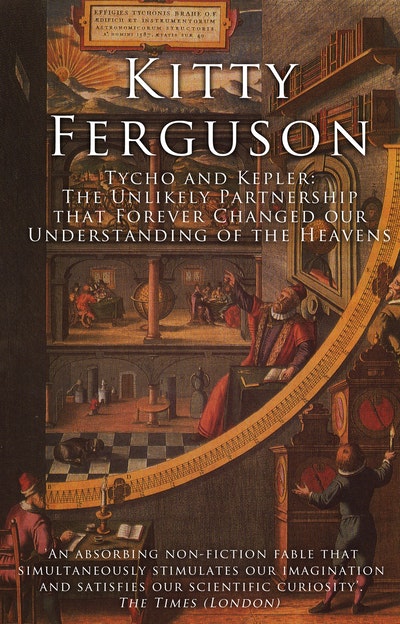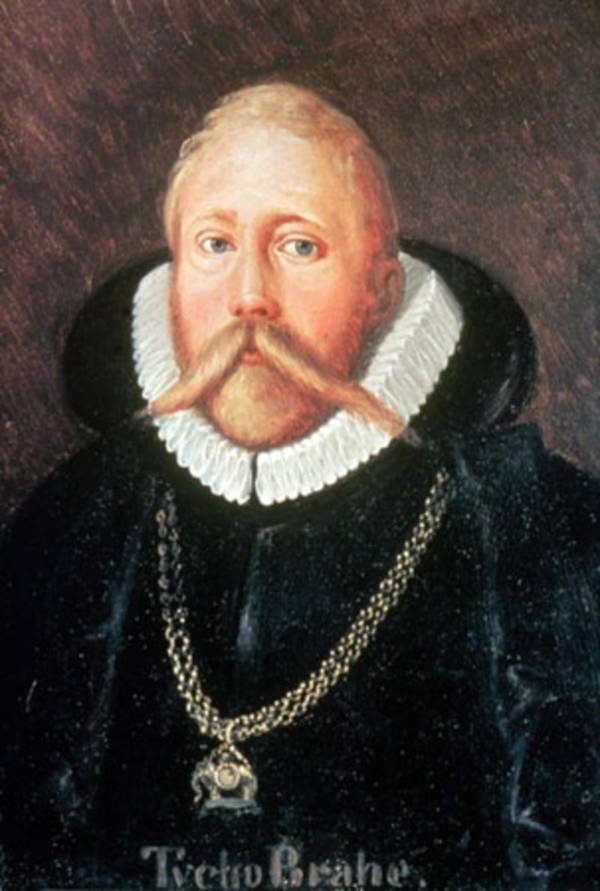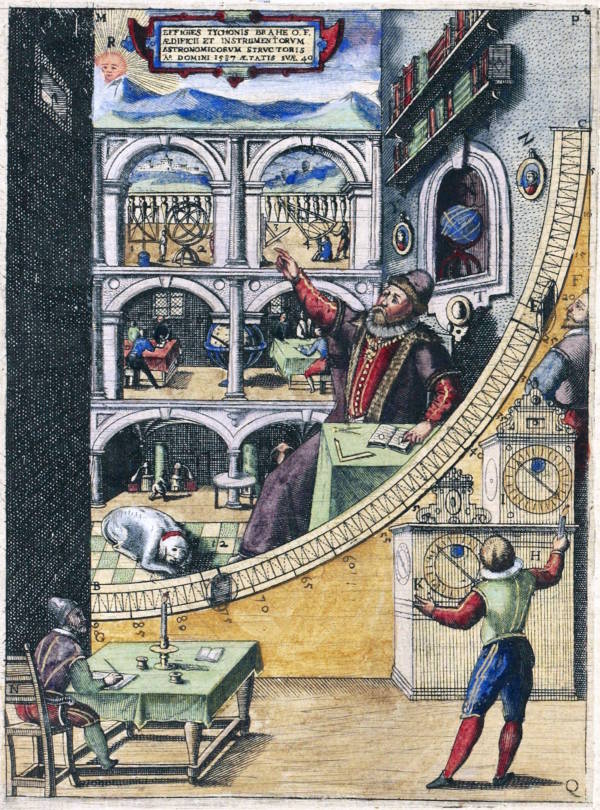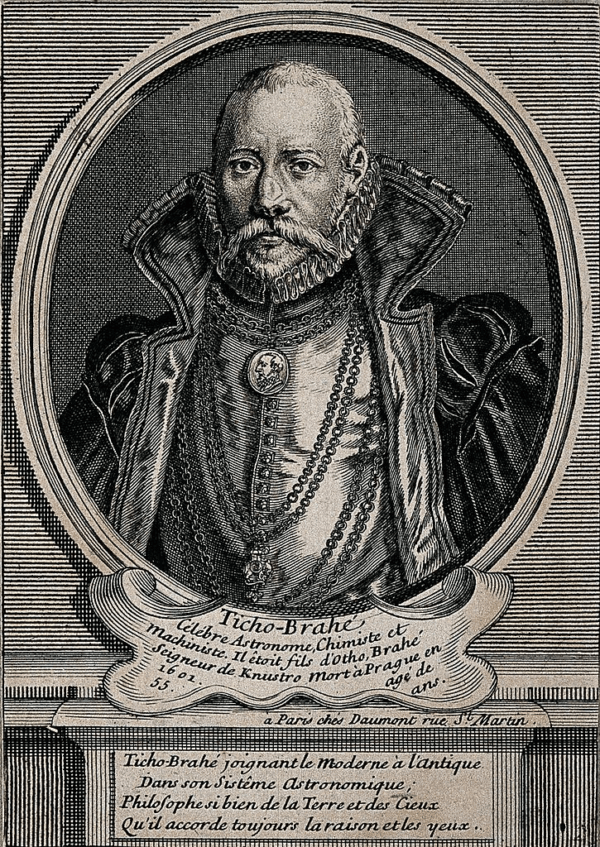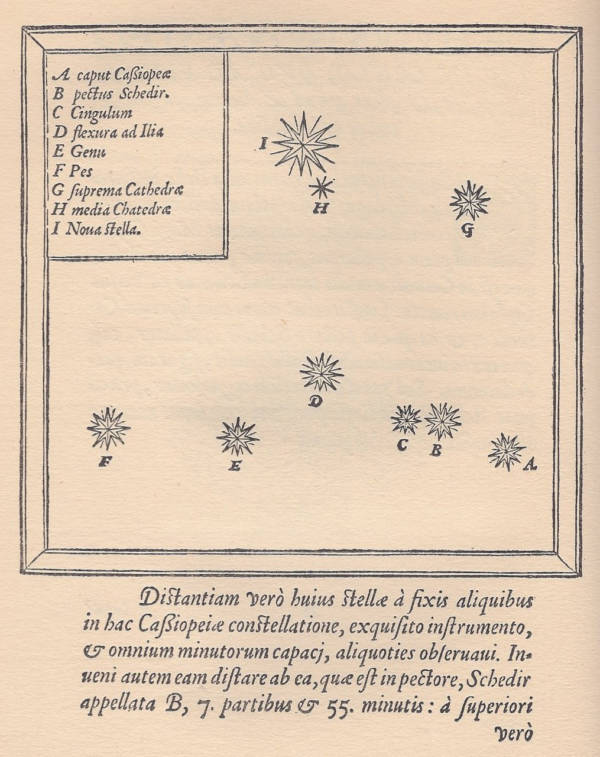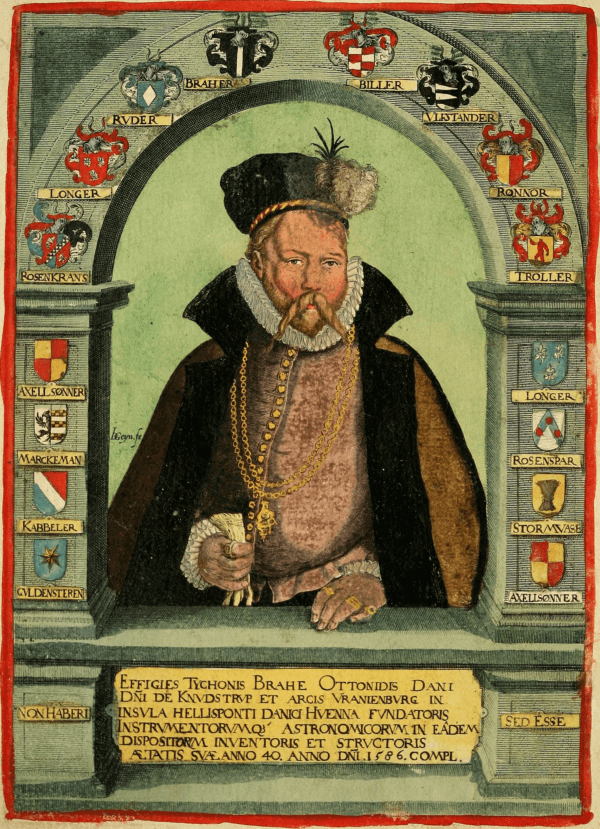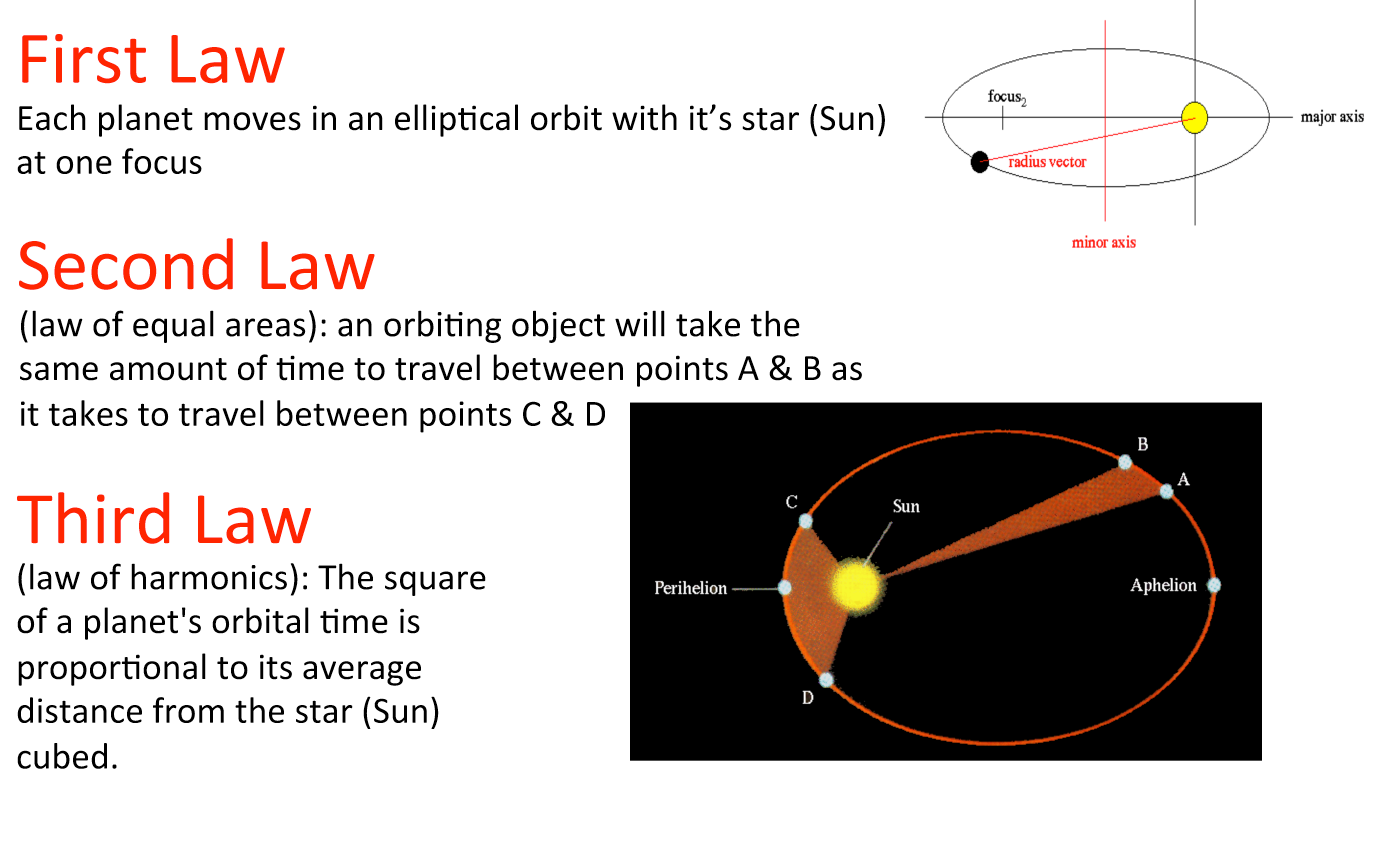The Keeper's Keys
-
Douglas Mercer
- Posts: 10947
- Joined: Tue Mar 28, 2023 7:29 pm
The Keeper's Keys
Douglas Mercer
August 18 2024
The gods shine above our heads
We saw nothing but form
By any stretch of the imagination Tycho Brahe was the greatest observer of the skies of all time; astronomer, astrologer, and alchemist he was the last great astronomer before the advent of the telescope. In 1572 Brahe suddenly saw a new star which he knew should not have been there, and it fired his imagination; the King granted the great Dane an estate all his own on the island of Hven on which the scientist built Uraniborg, the first large observatory in Europe; the heir to several noble families Brahe was highly educated and he became obsessed; obsessed with putting the swirling new theories of planetary orbits on a solid footing and overturning the long centuries of dogmatic slumbers of Europe and firing the imagination to the depth of interstellar spaces; initially he was going to go into law but so mesmerized was he by the sky he decided to dedicate his life to its study and so the obsession grew inside him; an astronomer of the pre telescope era he used only his naked eye to scan the heavens from his secluded Ayrie; he wrote down everything he saw and made calculations daily; he had made himself into a recording device to translate the sky to paper, thus becoming a vessel or conduit of the god; this was monomania, this was the inner drive and the inner compulsion to discover the truth, the tunnel vision that follows one’s own star until it explodes in the night sky; this is the only means by which man ever has or ever will progress; the location of Uraniborg was chosen for seclusion, it was one more version of the chill glacial heights of the Icy Hyperboreans, away from meddling hands and prying eyes, we like it up here without you; this was the far Northern clime where truth is looked at squarely; here there was nothing interfering with time, light or motion observations: here was one man on a sacred mission to bring the fire of the gods to his people; this was an Aryan man on the cusp of the final project; to understand the universe in order to make it our own.
In addition to being a scholar and an observer of massive repute Brahe was also a flamboyant rouge around whom hung more than an air of menace; he was sui generis, one of a kind, a life size unicorn of epic proportions; having lost his nose in a duel he had a new gold one; he was a raconteur and fantasist of the first order and high water; no vagabond he would caravan around with his equipment and his potions and his instruments replete with courtiers, outriders, hangers on, animals, wagons, mimicking a kind of Royal Progress; he had his own court of various animals, dogs and dwarves; and he would sit at the head of this table and hold forth on any number of topics in the grand style; that is in addition to understanding the world he enjoyed it; with great appetite for knowledge and for joy being around him was always a journey into the unknown.
***
Johannes Kepler was his exact opposite. In possession of one of the most rarefied minds that has ever been he was given to both far flung hypotheses and to the most precise and incisive thinking; he both cast horoscopes and set our race on the exacting path of truth about the physical world. Born in Germany he was introduced to astronomy at an early age and quickly developed a strong passion for it. He was shy, quiet and introverted, and wholly dedicated to the quest for knowledge; early on he became a dedicated expositor of Copernican heliocentrism and, indeed, was the one who finally put this theory on a proven basis; he was a Cosmotheist and believed in the deep connection between the whole and the part, between the individual and the cosmos, between the physical and the spiritual; he also was firm believe that nature itself was a language and that it was a language that one could read. In 1596 he published a book called the Mysterium Cosmographicum (Cosmic Mystery) in which he used ratio and geometric solids to defend Copernicus; of this book he wrote of a divine ordinance and that the book was the result of an epiphany; he wrote that there was a geometric basis to the universe and soon came to believe that he had been put on earth to expose it.
***
The meeting of Brahe and Kepler was one of fate; Brahe with his assiduous observations had a treasure trove of data that was unparalleled; he dreamt that he would be the one to crack the cosmic code and become one of the immortals, but of such a puzzling nature was it that he did not have the mathematical knowledge for such a thing. Kepler for his part felt himself fated to be that immortal one but he did not have the bank of information required to attain it; and so when in 1600 (fateful year) he and Brahe crossed paths the pathway to the future got underway; the two were an unlikely pair and the hermit philosopher met the grandiose and flamboyant histrionic actor given to paranoia; the two circled around each other in their fateful embrace, and created what can only be called a comic tableau. Brahe would be sitting at the head of the table the host of a boisterous, rowdy dinner, convivial like a carnival, very much the universally acknowledged leader of his motley clan, which was said to include a drunken elk, a dwarf named Jepp, and various hangers on; and then there was Kepler dressed in black the model of modesty, seriousness and virtue; Brahe had the information hoard and from time to time Kepler at the table would ask him for a scrap from the masters table, akin to the literal ones he would throw the dwarf Jepp. It is said that he would toss it off like he would a bone to a dog, an apogee one day, a node another then stone silence; with a deference befitting his humble status as a hired hand Kepler would gently ask for more; all in due time boy came the near inevitable reply. The two were locked in a dysfunctional relationship which was amusing in retropspect; on the cusp of the greatest conception to date, not only the important step of a law and what that law was but more important, that there were laws which would lead to method and more laws—that is the primal breakthrough—the two were caught up in jealousy, intrigue, backbiting, fear, money, and aspiration for earthly fame and glory—instead of simply sharing the information which wanted to be free and seeing where it would take them. Brahe knew in his heart that Kepler was the only one who could decipher the code, but if he did he would be the immortal; what he was hoping was that it would be a seesaw conversation and he could give Kepler some data and Kepler would give him an idea and it could be his law; but he knew if he gave Kepler the Keys to the Kingdom at once it might just the other man’s palm; on the other hand Brahe knew that it was more than likely that Kepler was the one star he could hitch his wagon to that would lead to posthumous fame of at least a derivative sort; and so the double bind continued. Finally after much negotiation and vitriolic letters full of acrimony and accusation and subsequent apologies Kepler put his foot down; he would no longer be a guest or a beggar; and he took the gamble: give him the information or he would leave. Realizing that this was an impasse Brahe relented and assigned him to Mars. Kepler had thus wrung the treasure trove from Brahe, and no longer was the older man like a dragon sitting atop a hoard of gold: information was breaking free. It would be the gift that kept on giving, but also a weight on Kepler’s shoulders; he had brashly and rashly boasted to Brahe that if he had all the data he could dash off Mars in eight days; but a pesky eight minutes got in the way and it took him eight years. But as they say nothing of value in life comes without a struggle.
It was said that when Kepler first met Brahe it was like discovering that a figure from a fairy tale was actually real. But Mars soon became for him what it was for all the vying scholars of Europe: the white whale against which more than a few had crashed their ship. The Red Planet had the greatest eccentricity of all, and it had the odd habit of appearing to slide forward seamlessly and then suddenly halt its progress, move backward for a time, and then once more goes on it way, as if it were unsure of its destiny before finally making up its mind. There were many working theories of the orbit of Mars but as always all but the final one were provisional, vision and revisions which those idiosyncratic eight minutes would always reverse. Kepler had his polyhedral theory, Brahe had a pet one of his own, and those epicycles within epicycles lingered on; egg shapes were proposed and ovals, as if the planet was running in rings around a racetrack headlong to who knew where; Kepler thought that as the planets made their appointed rounds they let off a rush of sound which when in ratio (1:2:3:4, or otherwise) made a harmonic convergence of sound which would have been pleasing to the human ear if it ever reached them. The standard a priori belief, based on nothing but human so-called authority was that planets must move in circles and that they must do so because they must; and so like bad bank notes the error was passed on from hand to hand, no one of them specifically lying, but just bathed in inherited ignorance until someone decided to hold the paper up to the light and see through the illusion. What Kepler was sure of, what sustained him on those long nights of assiduous and painstaking travail and holy struggle, was that God had established an underlying logic to it all, though at times he came to be perplexed and even somewhat disappointed in the creator when the cosmic artist seemed to veer from his geometric norm; but on good nights when a discovery came to him, when another step on the way was laid down, he would feel that inner intensity of delight that he was positive mirrored the pure joy that God had experienced when he created it; he soon learned that the trick of it all was that the preconceived notions of human perfection had no place here, that things were always just a bit skew or oblique, a bit off, as if the god always told the truth but equally always told it slant, as if it wanted to have the truth guarded and select its own society and bar the door. When anyone wanders into the precincts of the god it wants to be sure of an iron discipline and a free mind.
For Kepler Mars represented a rage provoking force, an arduous task of seemingly infinite toil; yet its solution in hindsight was simple in its elegance and elegant in its simplicity; and its solution represents the human mind at its most subtle and its most cunning and its most courageous; here Aryan Genius was on display in its wide variety of flexibility and versatility and tenacity; indeed, Brahe had wagered his immortality on Kepler and the dividends were forthcoming; Kepler said that when he was given Mars by his master he was “given his head” and so he was. And one soft night in those far Northern European latitudes Kepler decided to stop being recalcitrant and asked himself a tentative question: could it perhaps be that it is not a circle? Maybe it is an ellipse. And all the locks immediately opened up and the doors to paradise swung open wide; and better yet the castle keep was unoccupied as the first of us wandered into its sacred space. By now it is known that this underlying logic of the god means that we are becoming gods, that is time and nature’s open secret but not a lot of people know it. And in his journal on the night in question Kepler, still time bound in his ideology if not his pure thought, wrote that he had stolen the Ark Of The Covenant. But he had done no such thing; what he had done was stolen the keys right from under the keeper’s nose. A poacher he was, the dearest thing of all. No longer a somnambulist or a fantasist, but the first to cross the threshold into being an awakened one.
***
Notes:
Elliptical def.: relating to, or marked by extreme economy of speech or writing, of or relating to deliberate obscurity (as of literary or conversational style)
Brahe returned to Denmark around 1570 and built himself an observatory at the former monastery of Herrevad Abbey, which had recently come into possession of one of his relatives. It was at Herrevad in 1572 that Tycho Brahe made a strange observation one November night. Brahe’s eyes were drawn to a star in the night sky that was shining brighter than the planet Venus. Even more surprising, the star was appearing in a spot no star had ever been recorded, in the constellation Cassiopeia. Upon further study, he realized that not only had he discovered a new star, but that it was a fixed star that was further away than the Moon and all the other planets. In 1573, he recorded his findings in the book De Nova Stella, which garnered him renown as an astronomer throughout Europe. In the book, the title of which translates to “On the New Star,” Tycho Brahe also established the term “nova” to describe a new star (although the particular star he discovered has since been classified as a supernova).
In particular, he became fascinated by the Martian problem – the fact that at certain times the Red Planet appeared to go backwards across the sky, before correcting itself and heading off again in the right direction. Solving the problem, he boasted, would take him just eight days. It ended up taking eight years, but solve it he did, breaking new ground from his predecessors and laying the foundations for modern astronomy in the process.
Tycho has the best observations—that is to say the materials to put up the building---but he lacks the master builder. Although he had an extremely architectonic mind the variety and the depth of the truths we were dealing with here were beyond him. By divine providence he put me on the task of Mars.
Mars was like a racer by coming inside the circle of a circular racetrack. Doing that while still having to make it around two goalposts would change a circular race into an oval race. The precise amount by which Mars was cheating was diabolically difficult to establish.
First, while Copernicus thought all orbits were perfectly circular, Kepler deduced the planets do not move in circular orbits, but in ellipses. In addition, Kepler realized the Sun does not sit in the center of a spherical universe, as Copernicus believed, but off to one side of the orbits. Kepler made a great advance by using the position of the true sun rather than a fictional position, and by surmising that there must be a force in the sun.
At one point Kepler was dissatisfied with what god had wrought and drily noted that in this instance we have found an ungeometrical conception which is not present in his other works
Had Newton never existed the laws that bear his name would most certainly have been found; had Shakespeare never existed the plays that bear his name would never have come into being; that is one discovered something and the other created something; and becoming a god is different than begetting gods, that is a distinction with a difference, or all the difference in the world.
The law of equal areas and equal times can be represented by pen on paper; it uses methods discovered in Greece in 300 BC. To the practical mind these marks on paper are quintessential human constructs; some biologists will tell us that the fact that human beings are here is a fluke, a statistical rounding error, that is from the point of view of eternity it was overwhelmingly improbable that humans ever would have made their appearance. Yet those marks on paper that Kepler came up with bear a one-to-one correspondence with physical reality, that is they are blueprints and abstract representation of something independent of human beings. It would be odd indeed if such a theoretical plan of thought instantiated in the universe should have existed but no creatures ever would have come along to promulgate them, as if the horse had for once strayed in front of the cart. This is incontrovertible ineluctable proof positive that these are not human laws but the creator’s laws, the only begetter.
They say that when he got to the infamous Vicarious Hypotheses Kepler reached an impasse, but it proved imaginary. He quickly backtracked a bit and then proceed toward his goal.
It was said that creator does not play dice with universe, not true; all it does is play this game, die are always being cast, but they are loaded and the house always wins. Indeed sometimes so much so that it occurs to me as I look around my room that the graphics are so good it seems almost real. Soon enough it will be a folly or madness shared by a lot more than two.
August 18 2024
The gods shine above our heads
We saw nothing but form
By any stretch of the imagination Tycho Brahe was the greatest observer of the skies of all time; astronomer, astrologer, and alchemist he was the last great astronomer before the advent of the telescope. In 1572 Brahe suddenly saw a new star which he knew should not have been there, and it fired his imagination; the King granted the great Dane an estate all his own on the island of Hven on which the scientist built Uraniborg, the first large observatory in Europe; the heir to several noble families Brahe was highly educated and he became obsessed; obsessed with putting the swirling new theories of planetary orbits on a solid footing and overturning the long centuries of dogmatic slumbers of Europe and firing the imagination to the depth of interstellar spaces; initially he was going to go into law but so mesmerized was he by the sky he decided to dedicate his life to its study and so the obsession grew inside him; an astronomer of the pre telescope era he used only his naked eye to scan the heavens from his secluded Ayrie; he wrote down everything he saw and made calculations daily; he had made himself into a recording device to translate the sky to paper, thus becoming a vessel or conduit of the god; this was monomania, this was the inner drive and the inner compulsion to discover the truth, the tunnel vision that follows one’s own star until it explodes in the night sky; this is the only means by which man ever has or ever will progress; the location of Uraniborg was chosen for seclusion, it was one more version of the chill glacial heights of the Icy Hyperboreans, away from meddling hands and prying eyes, we like it up here without you; this was the far Northern clime where truth is looked at squarely; here there was nothing interfering with time, light or motion observations: here was one man on a sacred mission to bring the fire of the gods to his people; this was an Aryan man on the cusp of the final project; to understand the universe in order to make it our own.
In addition to being a scholar and an observer of massive repute Brahe was also a flamboyant rouge around whom hung more than an air of menace; he was sui generis, one of a kind, a life size unicorn of epic proportions; having lost his nose in a duel he had a new gold one; he was a raconteur and fantasist of the first order and high water; no vagabond he would caravan around with his equipment and his potions and his instruments replete with courtiers, outriders, hangers on, animals, wagons, mimicking a kind of Royal Progress; he had his own court of various animals, dogs and dwarves; and he would sit at the head of this table and hold forth on any number of topics in the grand style; that is in addition to understanding the world he enjoyed it; with great appetite for knowledge and for joy being around him was always a journey into the unknown.
***
Johannes Kepler was his exact opposite. In possession of one of the most rarefied minds that has ever been he was given to both far flung hypotheses and to the most precise and incisive thinking; he both cast horoscopes and set our race on the exacting path of truth about the physical world. Born in Germany he was introduced to astronomy at an early age and quickly developed a strong passion for it. He was shy, quiet and introverted, and wholly dedicated to the quest for knowledge; early on he became a dedicated expositor of Copernican heliocentrism and, indeed, was the one who finally put this theory on a proven basis; he was a Cosmotheist and believed in the deep connection between the whole and the part, between the individual and the cosmos, between the physical and the spiritual; he also was firm believe that nature itself was a language and that it was a language that one could read. In 1596 he published a book called the Mysterium Cosmographicum (Cosmic Mystery) in which he used ratio and geometric solids to defend Copernicus; of this book he wrote of a divine ordinance and that the book was the result of an epiphany; he wrote that there was a geometric basis to the universe and soon came to believe that he had been put on earth to expose it.
***
The meeting of Brahe and Kepler was one of fate; Brahe with his assiduous observations had a treasure trove of data that was unparalleled; he dreamt that he would be the one to crack the cosmic code and become one of the immortals, but of such a puzzling nature was it that he did not have the mathematical knowledge for such a thing. Kepler for his part felt himself fated to be that immortal one but he did not have the bank of information required to attain it; and so when in 1600 (fateful year) he and Brahe crossed paths the pathway to the future got underway; the two were an unlikely pair and the hermit philosopher met the grandiose and flamboyant histrionic actor given to paranoia; the two circled around each other in their fateful embrace, and created what can only be called a comic tableau. Brahe would be sitting at the head of the table the host of a boisterous, rowdy dinner, convivial like a carnival, very much the universally acknowledged leader of his motley clan, which was said to include a drunken elk, a dwarf named Jepp, and various hangers on; and then there was Kepler dressed in black the model of modesty, seriousness and virtue; Brahe had the information hoard and from time to time Kepler at the table would ask him for a scrap from the masters table, akin to the literal ones he would throw the dwarf Jepp. It is said that he would toss it off like he would a bone to a dog, an apogee one day, a node another then stone silence; with a deference befitting his humble status as a hired hand Kepler would gently ask for more; all in due time boy came the near inevitable reply. The two were locked in a dysfunctional relationship which was amusing in retropspect; on the cusp of the greatest conception to date, not only the important step of a law and what that law was but more important, that there were laws which would lead to method and more laws—that is the primal breakthrough—the two were caught up in jealousy, intrigue, backbiting, fear, money, and aspiration for earthly fame and glory—instead of simply sharing the information which wanted to be free and seeing where it would take them. Brahe knew in his heart that Kepler was the only one who could decipher the code, but if he did he would be the immortal; what he was hoping was that it would be a seesaw conversation and he could give Kepler some data and Kepler would give him an idea and it could be his law; but he knew if he gave Kepler the Keys to the Kingdom at once it might just the other man’s palm; on the other hand Brahe knew that it was more than likely that Kepler was the one star he could hitch his wagon to that would lead to posthumous fame of at least a derivative sort; and so the double bind continued. Finally after much negotiation and vitriolic letters full of acrimony and accusation and subsequent apologies Kepler put his foot down; he would no longer be a guest or a beggar; and he took the gamble: give him the information or he would leave. Realizing that this was an impasse Brahe relented and assigned him to Mars. Kepler had thus wrung the treasure trove from Brahe, and no longer was the older man like a dragon sitting atop a hoard of gold: information was breaking free. It would be the gift that kept on giving, but also a weight on Kepler’s shoulders; he had brashly and rashly boasted to Brahe that if he had all the data he could dash off Mars in eight days; but a pesky eight minutes got in the way and it took him eight years. But as they say nothing of value in life comes without a struggle.
It was said that when Kepler first met Brahe it was like discovering that a figure from a fairy tale was actually real. But Mars soon became for him what it was for all the vying scholars of Europe: the white whale against which more than a few had crashed their ship. The Red Planet had the greatest eccentricity of all, and it had the odd habit of appearing to slide forward seamlessly and then suddenly halt its progress, move backward for a time, and then once more goes on it way, as if it were unsure of its destiny before finally making up its mind. There were many working theories of the orbit of Mars but as always all but the final one were provisional, vision and revisions which those idiosyncratic eight minutes would always reverse. Kepler had his polyhedral theory, Brahe had a pet one of his own, and those epicycles within epicycles lingered on; egg shapes were proposed and ovals, as if the planet was running in rings around a racetrack headlong to who knew where; Kepler thought that as the planets made their appointed rounds they let off a rush of sound which when in ratio (1:2:3:4, or otherwise) made a harmonic convergence of sound which would have been pleasing to the human ear if it ever reached them. The standard a priori belief, based on nothing but human so-called authority was that planets must move in circles and that they must do so because they must; and so like bad bank notes the error was passed on from hand to hand, no one of them specifically lying, but just bathed in inherited ignorance until someone decided to hold the paper up to the light and see through the illusion. What Kepler was sure of, what sustained him on those long nights of assiduous and painstaking travail and holy struggle, was that God had established an underlying logic to it all, though at times he came to be perplexed and even somewhat disappointed in the creator when the cosmic artist seemed to veer from his geometric norm; but on good nights when a discovery came to him, when another step on the way was laid down, he would feel that inner intensity of delight that he was positive mirrored the pure joy that God had experienced when he created it; he soon learned that the trick of it all was that the preconceived notions of human perfection had no place here, that things were always just a bit skew or oblique, a bit off, as if the god always told the truth but equally always told it slant, as if it wanted to have the truth guarded and select its own society and bar the door. When anyone wanders into the precincts of the god it wants to be sure of an iron discipline and a free mind.
For Kepler Mars represented a rage provoking force, an arduous task of seemingly infinite toil; yet its solution in hindsight was simple in its elegance and elegant in its simplicity; and its solution represents the human mind at its most subtle and its most cunning and its most courageous; here Aryan Genius was on display in its wide variety of flexibility and versatility and tenacity; indeed, Brahe had wagered his immortality on Kepler and the dividends were forthcoming; Kepler said that when he was given Mars by his master he was “given his head” and so he was. And one soft night in those far Northern European latitudes Kepler decided to stop being recalcitrant and asked himself a tentative question: could it perhaps be that it is not a circle? Maybe it is an ellipse. And all the locks immediately opened up and the doors to paradise swung open wide; and better yet the castle keep was unoccupied as the first of us wandered into its sacred space. By now it is known that this underlying logic of the god means that we are becoming gods, that is time and nature’s open secret but not a lot of people know it. And in his journal on the night in question Kepler, still time bound in his ideology if not his pure thought, wrote that he had stolen the Ark Of The Covenant. But he had done no such thing; what he had done was stolen the keys right from under the keeper’s nose. A poacher he was, the dearest thing of all. No longer a somnambulist or a fantasist, but the first to cross the threshold into being an awakened one.
***
Notes:
Elliptical def.: relating to, or marked by extreme economy of speech or writing, of or relating to deliberate obscurity (as of literary or conversational style)
Brahe returned to Denmark around 1570 and built himself an observatory at the former monastery of Herrevad Abbey, which had recently come into possession of one of his relatives. It was at Herrevad in 1572 that Tycho Brahe made a strange observation one November night. Brahe’s eyes were drawn to a star in the night sky that was shining brighter than the planet Venus. Even more surprising, the star was appearing in a spot no star had ever been recorded, in the constellation Cassiopeia. Upon further study, he realized that not only had he discovered a new star, but that it was a fixed star that was further away than the Moon and all the other planets. In 1573, he recorded his findings in the book De Nova Stella, which garnered him renown as an astronomer throughout Europe. In the book, the title of which translates to “On the New Star,” Tycho Brahe also established the term “nova” to describe a new star (although the particular star he discovered has since been classified as a supernova).
In particular, he became fascinated by the Martian problem – the fact that at certain times the Red Planet appeared to go backwards across the sky, before correcting itself and heading off again in the right direction. Solving the problem, he boasted, would take him just eight days. It ended up taking eight years, but solve it he did, breaking new ground from his predecessors and laying the foundations for modern astronomy in the process.
Tycho has the best observations—that is to say the materials to put up the building---but he lacks the master builder. Although he had an extremely architectonic mind the variety and the depth of the truths we were dealing with here were beyond him. By divine providence he put me on the task of Mars.
Mars was like a racer by coming inside the circle of a circular racetrack. Doing that while still having to make it around two goalposts would change a circular race into an oval race. The precise amount by which Mars was cheating was diabolically difficult to establish.
First, while Copernicus thought all orbits were perfectly circular, Kepler deduced the planets do not move in circular orbits, but in ellipses. In addition, Kepler realized the Sun does not sit in the center of a spherical universe, as Copernicus believed, but off to one side of the orbits. Kepler made a great advance by using the position of the true sun rather than a fictional position, and by surmising that there must be a force in the sun.
At one point Kepler was dissatisfied with what god had wrought and drily noted that in this instance we have found an ungeometrical conception which is not present in his other works
Had Newton never existed the laws that bear his name would most certainly have been found; had Shakespeare never existed the plays that bear his name would never have come into being; that is one discovered something and the other created something; and becoming a god is different than begetting gods, that is a distinction with a difference, or all the difference in the world.
The law of equal areas and equal times can be represented by pen on paper; it uses methods discovered in Greece in 300 BC. To the practical mind these marks on paper are quintessential human constructs; some biologists will tell us that the fact that human beings are here is a fluke, a statistical rounding error, that is from the point of view of eternity it was overwhelmingly improbable that humans ever would have made their appearance. Yet those marks on paper that Kepler came up with bear a one-to-one correspondence with physical reality, that is they are blueprints and abstract representation of something independent of human beings. It would be odd indeed if such a theoretical plan of thought instantiated in the universe should have existed but no creatures ever would have come along to promulgate them, as if the horse had for once strayed in front of the cart. This is incontrovertible ineluctable proof positive that these are not human laws but the creator’s laws, the only begetter.
They say that when he got to the infamous Vicarious Hypotheses Kepler reached an impasse, but it proved imaginary. He quickly backtracked a bit and then proceed toward his goal.
It was said that creator does not play dice with universe, not true; all it does is play this game, die are always being cast, but they are loaded and the house always wins. Indeed sometimes so much so that it occurs to me as I look around my room that the graphics are so good it seems almost real. Soon enough it will be a folly or madness shared by a lot more than two.

